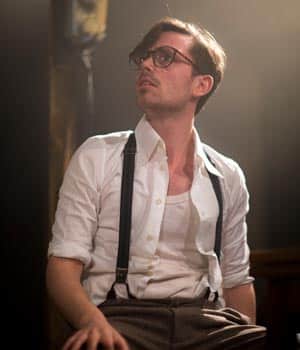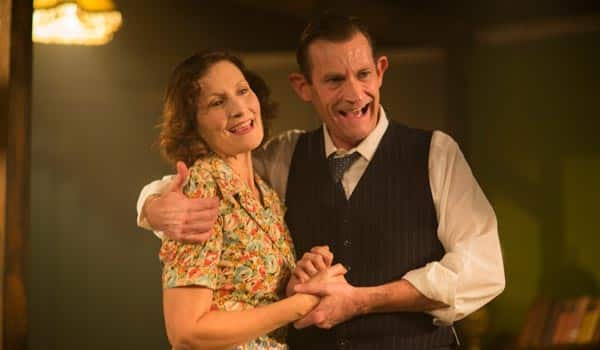
No Villain
Old Red Lion Theatre
10/12/15
5 Stars
The centenary of Arthur Miller’s birth has produced many notable revivals of the sustained string of famous plays he wrote in the late 1940s and 1950s. It has also shone a welcome, timely and revealing light on neglected works of his earlier years, notably The Man Who Had All The Luck, which the King’s Head Theatre staged a few months ago. Given the extent of both the academic literature surrounding him, and Miller’s own autobiographical writings, you would have thought that there is little more to be said about the formation and development of his career. Yet it is the achievement of director Sean Turner here to have done something no one could have anticipated – to give us the world premiere of Miller’s very first play, No Villain, in a superlative production that already shows the writer’s style in action. The press night, played in front of some very distinguished creative people, was a triumphant night in the theatre for all concerned.
In his memoir Timebends Miller mentions this play in passing as the most autobiographical of his writings, but says little more. It was written in 1936 when he was still only 21 and attending the University of Michigan. His father’s garment business had failed and he needed to win a writing prize in order to be able to pay his way. He duly did so, but purpose served, the play was then never performed and the mists of time closed over it. It was not known to the Miller Estate and director Sean Turner only tracked it down finally in the university archives and then gained permission to mount a production.

Many a play is revived for the sake of the author’s later reputation which then fails to justify its billing, but No Villain is not in this category. While it is not a lost masterpiece it is a fine piece of writing that is totally absorbing as drama and remarkable for the fact that the author’s trademark style is already largely in place in terms of both themes and technique.
The action runs straight through for ninety minutes, and for anyone who knows Miller’s work of the following ten years will immediately feel at home in the scenario. Tensions within a family and within the workplace are to the fore: fathers against sons, brother on brother. The conflict between what is right for the individual and what is good for the community is there right from the start, showing Miller’s distinctive take on a strand of drama that has been with us since the Greeks, and here revealing more than a trace of Ibsen. The role of ideology – Communism in this case – is explored and the fault line that creates when placed against the rival tug of personal and familial loyalties is the focus.
The voice is already fully formed too. The dialogue shows a remarkable maturity and poise. It is vividly imagistic at times, but convincingly naturalistic, and not self-consciously literary. The characters, even the minor ones, are well contrasted, with plenty of opportunities for naturalistic humour as well as grander dramatic tableaus. Above all, we see in operation that Miller trademark skill in creating an intolerable sequence of pressures and burdens on human beings in order to see whether carbon transmutes into diamond or shatters under the strain.
The action alternates between an apartment of faded gentility occupied by the downwardly mobile Barnett family and a garment factory office presided over by father Abe Barnett (David Bromley). Two atmospheric, detailed, yet also effortlessly simple designs by Max Dorey achieve wonders within the confined space of the Old Red Lion, so that scene transitions are effortless. The family’s fortunes are already declining in the Depression. Mother Esther (Nesba Crenshaw), is already showing signs of hysteria, and Abe veers between anxiety and fast-talking nonchalance as he tries to ensure that his factory can continue in business through a strike which is blocking the shipping of goods. Elder son Ben (George Turvey) has given up his own studies to help his father run the business; younger son Arny (Adam Hartley) is away at university and has embraced Marxism, and young sister Maxine (Helen Coles), a somewhat underwritten role, is enjoying teenage life largely disregarding the family pressure-cooker. Most unhappy of all is Grandpa Barnett, (Kenneth Jay) least able to adjust to living in straightened circumstances.
Everyone faces stark moral choices: do Abe and Ben use all possible means to get their goods through even if that puts their workers at risk? Does Arny help out his family business or follow through with his communist principles? Does Ben follow through with a loveless marriage that would rescue his family’s fortunes? Can Esther keep the family together and in amity, or must she choose her husband over her father? And connecting them all there is the question of how to hold onto a thin red thread of personal integrity when competing pulls of loyalty to principle and people point to different and contradictory pathways….

These dichotomies set up some wonderfully intense arguments and powerful exchanges that give the frisson of the real Arthur Miller at work. The exchanges between the two brothers, affectionate and rivalrous, are utterly compelling and provide the real motor for the play’s development; and the tensions in the workplace between Abe and Ben stand up well against parallel moments in All My Sons and Death of a Salesman. There are also tender moments between father and daughter, mother and sons, which also give an impressive sense of Miller’s range and maturity even as a young writer.
There are some problems with the play though, that need to be noted, problems that you might expect from an inexperienced playwright. There are some clunky speeches, including a summary of communist doctrines, that the older Miller would have cut, and the direction of the writing shifts about in a somewhat unstructured way that the older Miller would not have permitted. The focus early on, as the family wait for Arny to return from college, is on setting up a potential clash between his values and those of the family business – communism versus capitalism. However this never really comes. While Arny does refuse to help out during the strike the anticipated clash with his father never really happens, and Arny himself becomes side-lined in the play’s denouement.
Instead Miller becomes much more interested in the elder brother Ben, whose choices and personality becomes more complicated as the action develops. Ben is in fact also sympathetic to the workers’ cause while trying to juggle his commitment to family and to building an independent future for himself. In the most powerful confrontation of the play between the two brothers, Ben provides a scathing critique of simplistic ideological choices and we invited to consider the man who at least tries to reconcile the irreconcilable elements of daily life as the true hero. It is Ben too, not Arny or Abe, who get to make the final act of existential self-assertion at the very end of the action.
This ending left me with mixed feelings. It is melodramatic, but that is not truly the problem, as it was always part of Miller’s art to mingle a gritty naturalism with moments of heightened melodrama that feel exactly right, indeed inevitable, when they happen. It is rather that this ending seems more like a new beginning that raises a whole new raft of questions. In a play of this length one might naturally expect that we would then return for a second half in which these new directions would be explored. I sensed that most people in the audience were surprised therefore that the play concluded as it did rather than in father and son clash to which it seemed headed for much of its course. Had Miller revisited this text I suspect he might have extended these possibilities further into a full-length evening.
The performances are uniformly fine in this production. Turvey has the most demanding role to bring off in terms of character development and complexity, and he does it superbly. His rendering of Ben has exemplary emotional range and big-heartedness that rises fully to the challenges he is set. Likewise Bromley does very fine work in displaying Abe’s faded business skills and loss of self-confidence alongside a prickly defiance in the face of contradiction. His is a fine portrait of a man living on the edge of what he can cope with and process. It would be easy for Crenshaw to overplay Esther, but the gradations of her emotional collapse are well calibrated and controlled and it is a more affecting performance as a result. Hartley takes his moments well in a role that loses some focus in the writing towards the end, but he also makes Arny more sympathetic and human than he could be in other hands. Kenneth Jay, Stephen Omer and Anton Cross shape some fine detailed moments out of the minor characters.
It hard to see how the production side could be better done. It really is one of those cases where the discipline of a small performance space stimulates creative dividends. Not only are the sets a miracle of concise period evocation and practicality, but they are reinforced with a moody, fine-grained lighting design by Jack Weir, using a range of period light fittings, and an evocative sequence of jazzy interludes from sound designer Richard Melkonian. Turner directs in a fluent, well-paced style that makes the space seem larger than it is, while giving focus and intensity to the key one-to-one exchanges.
All involved in this production deserve the highest plaudits. The Old Red Lion’s programming in recent seasons has been commendable in its blend of new work and meticulous recovery of neglected or overlooked works by well-known authors. If this play transfers, as it deserves to, then this will be another vindication of the management’s artistic judgement. The cast and creative team are fully committed to this work and make as strong a case for it as could be. Above all the director should receive full credit for his entrepreneurial determination in tracking down this fugitive work and showcasing it with such fervour and stylistic good taste. The play itself would get four stars from me, but the outstanding production values and overall experience of the evening enable me to add a final star at the top of the tree.
No Villian runs at The Old Red Lion Theatre until 9th January 2016
